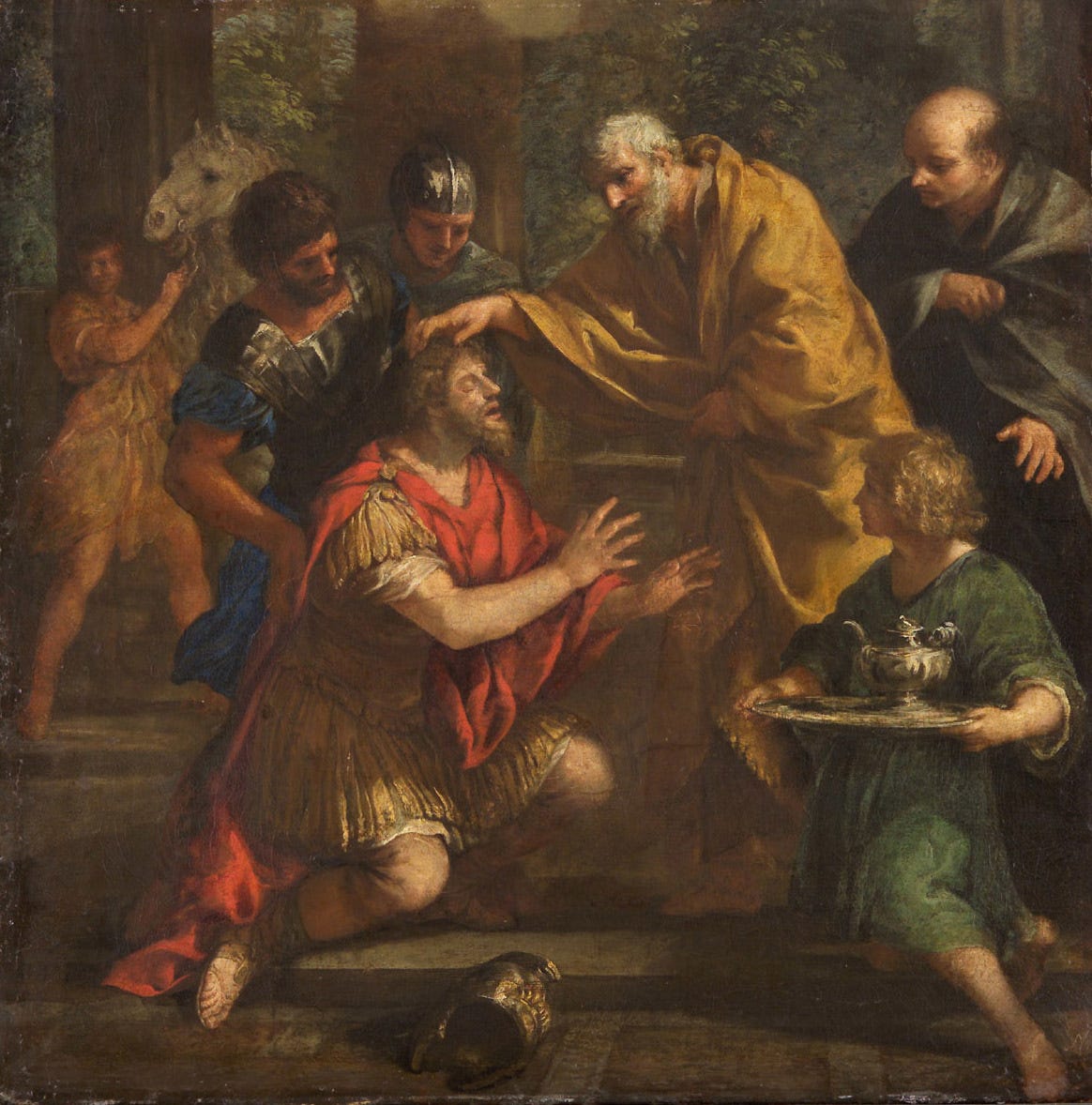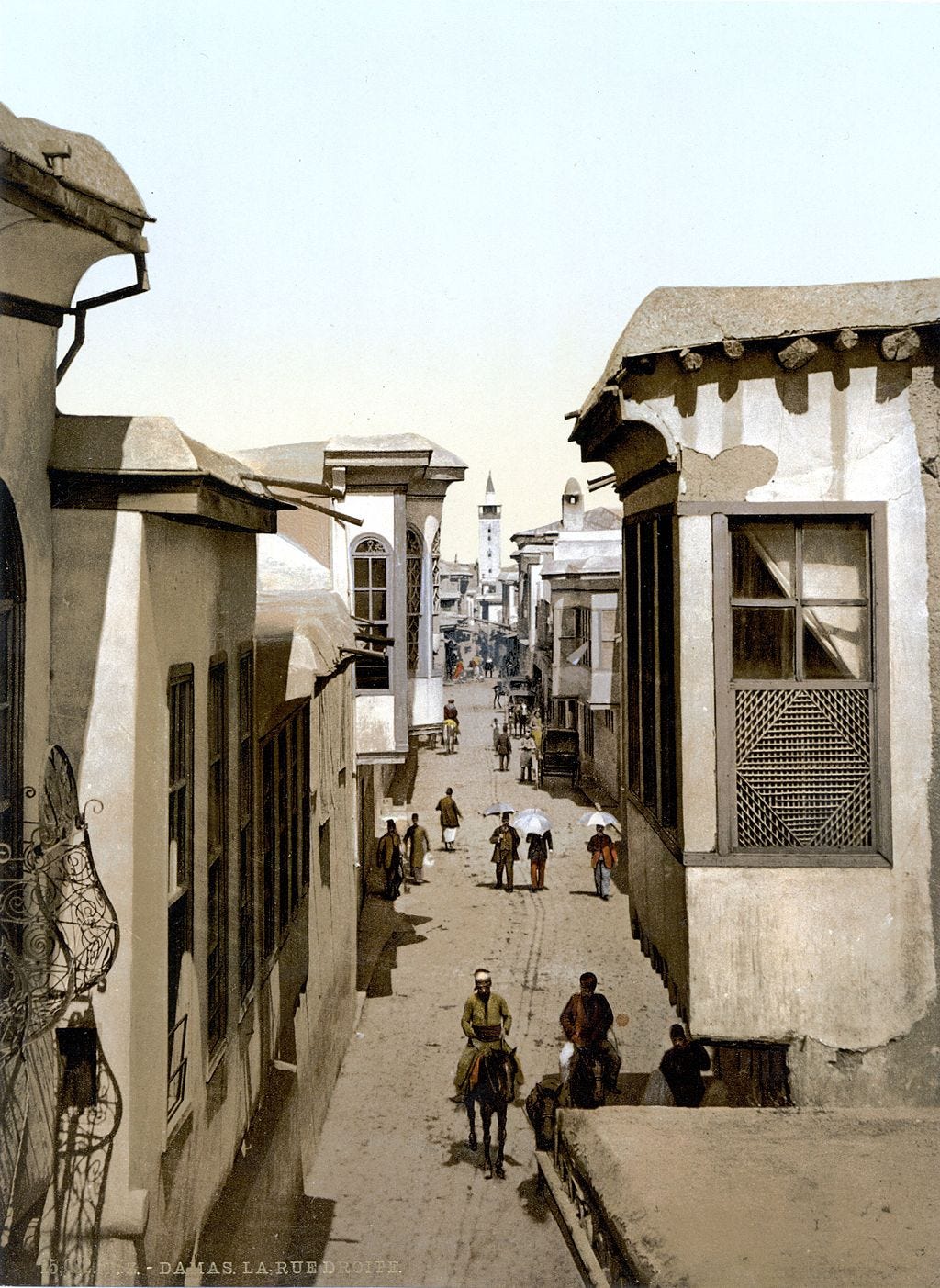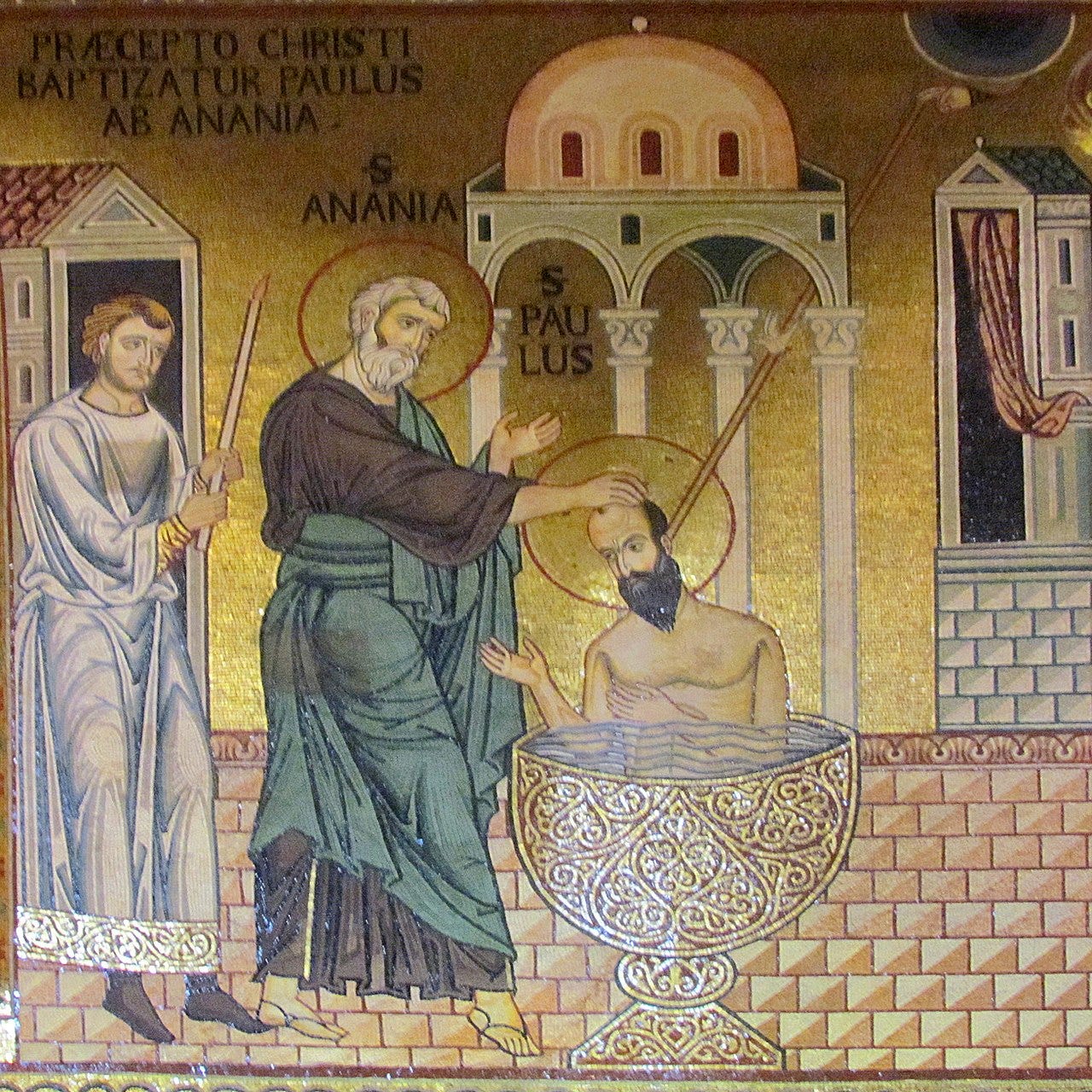A Study of Acts: Ananias has a Vision and Meets Saul
Acts 9:10-19a - Here I am, Lord! The Lord can reach anyone and use any believer for His divine purposes.
“Now there was a disciple at Damascus named Ananias; and the Lord said to him in a vision, “Ananias.” And he said, “Here I am, Lord.” And the Lord said to him, “Get up and go to the street called Straight, and inquire at the house of Judas for a man from Tarsus named Saul, for he is praying, and he has seen in a vision a man named Ananias come in and lay his hands on him, so that he might regain his sight.” But Ananias answered, “Lord, I have heard from many about this man, how much harm he did to Your saints at Jerusalem; and here he has authority from the chief priests to bind all who call on Your name.” But the Lord said to him, “Go, for he is a chosen instrument of Mine, to bear My name before the Gentiles and kings and the sons of Israel; for I will show him how much he must suffer for My name’s sake.” So Ananias departed and entered the house, and after laying his hands on him said, “Brother Saul, the Lord Jesus, who appeared to you on the road by which you were coming, has sent me so that you may regain your sight and be filled with the Holy Spirit.” And immediately there fell from his eyes something like scales, and he regained his sight, and he got up and was baptized; and he took food and was strengthened. Now for several days he was with the disciples who were at Damascus,”
Acts 9:10-19a NASB1995
We now meet the second man named Ananias in the book of Acts. This Ananias is a disciple, but is not renowned or considered a leader as this is his only appearance in Acts. The Lord calls him by his name in the vision: “Ananias”. His immediate response is “Here I am, Lord”. Now he receives extremely detailed instructions on what he is being commanded to do. I like this commentary from Enduring Word:
Now there was a certain disciple at Damascus named Ananias: We don’t know anything about Ananias from either before or after this meeting with Saul. We don’t know how he came to Damascus, or what happened to him afterward. From what we do know we can think of him as an average follower of Jesus – a certain disciple.
Ananias was an ordinary man – not an apostle, a prophet, a pastor, an evangelist, an elder, or a deacon. Yet God used him because he was an ordinary man. If an apostle or a prominent person had ministered to Saul, people might say Paul received his gospel from a man instead of Jesus. In the same way, God needs to use the certain disciple – there is a special work for them to do.
In theory, it wasn’t absolutely necessary that God use a man like Ananias for this work in Saul’s life. Being simply a certain disciple, we can say that God simply used Ananias because God loves to use people, and Ananias was a willing servant. Ananias asked Saul’s question, “Lord, what do You want me to do?” (Acts 9:6) by the way he lived his life.
To him the Lord said in a vision: God spoke to Ananias in a completely different way than He spoke to Saul. Saul had a bold, almost violent confrontation from God, but Ananias heard the voice of God sweetly in a vision, where God called and Ananias obediently responded. To say, “Here I am, Lord” is a perfect response to God.
We shouldn’t be surprised if people like Saul receive God’s Word with initial resistance and questioning. Yet we should expect disciples of Jesus to receive God’s Word like Ananias did.
In the case of Ananias, the vision from God was specific. God told him about:
A specific street (the street called Straight).
A specific house (the house of Judas).
A specific man (one called Saul of Tarsus).
A specific thing the man was doing (he is praying).
A specific vision the man had (in a vision he has seen a man named Ananias).
This specificity was necessary and important, because God asked Ananias to do something bold and dangerous in meeting Saul, the great persecutor. He needed confirmation along the way that God was guiding him, and God gave him ways to confirm this.
Arise and go: God’s instructions to Ananias were clear, but curiously, God told Ananias about Saul’s vision in Ananias’ own vision.
Behold, he is praying: This indicated a true change of heart in this man famous for persecuting the disciples of Jesus. One might say that Saul had never really prayed before; he merely repeated formal prayers. Before this:
His prayers were more mechanical than spiritual.
He had never prayed with Jesus as mediator.
He had never prayed in Jesus’ name.
He had not prayed with a humble heart, near to God.
Saul had said many prayers, but he had never truly prayed.
The Lord gives Ananias a vision and tells him that Saul has also had a vision that has Ananias restoring his vision. The directions He gives Ananias are extremely detailed and cannot be misunderstood. Here’s a photo, from Wikipedia, of Straight Street in about 1900 in Damascus (now with different names) - it was the only street that ran straight from the east gate to the west gate of the old city and has been compared in commentary to Fifth Avenue in New York or Regent Street in London, a street of wealthy people and high-end commerce:
Ananias is to find the house of Judas on Straight Street. We don’t know who this Judas is, but commentary I read on Precept Austin indicates that he was likely a Jewish friend of Saul and may have been the person that Saul was planning to stay with as he gathered up and arrested the hated people of the Way in Damascus. Judas was certainly not a believer, because he would not let someone like Saul in the door. Saul is there now at this house, blinded and fervently praying, probably for the first time in his life, even though he was supposedly a devout Pharisee. He has had the vision of Ananias healing him.
Although Ananias had the right first response, when he hears who he must find at the house of Judas, he questions the Lord. Saul’s reputation has preceded him and Ananias, although devout, is also a human being who is concerned about the harm that Saul can do believers like himself. The Lord doesn’t chastise Ananias but just tells him that he must go, because Saul is now a chosen instrument of His to bring the word to Gentiles, Kings and the sons of Israel. Enduring Word has the best commentary on this passage:
Lord, I have heard from many about this man: Certainly, Ananias had heard that this angry and violent persecutor named Saul of Tarsus was on his way from Jerusalem. The disciples in Damascus must have anxiously prepared for the coming persecution.
I have heard from many about this man, how much harm he has done: Ananias’ objections were perfectly logical and well founded. However, they presumed that God needed instruction, or at best, counsel. Ananias almost asked, “God, do you know what kind of guy this Saul is?”
In fact, Ananias knew a great deal about the mission of Saul (how much harm he has done to Your saints in Jerusalem…here he has authority from the chief priests to bind all who call on Your name). It was apparently widely known.
He is a chosen vessel of Mine to bear My name: God had a call upon the life of Saul. At this time, God had not yet revealed that calling to Saul. He seems to have told Ananias first.
God considered Saul His chosen vessel long before there appeared anything worthy in Saul to choose. God knew what He could make of Saul, even when Saul or Ananias didn’t know.
To bear My name before Gentiles, kings, and the children of Israel: This describes in broad outline the calling and future work of the broken, blind, afflicted man Ananias would soon meet. God called him to bring who He is and what He has done (My name) to Gentiles, to kings, and to the children of Israel.
We would not blame Ananias for a measure of disbelief – such a great, big calling for such an unlikely man.
For I will show him how many things he must suffer for My name’s sake: This was a sobering addition to the great call God put upon the life of Saul. Saul would leave a life of privilege to embrace a higher call, but a call with much suffering.
Ananias does what the Lord commands, which is probably one of the bravest things he has ever done (I’m not sure I could be that brave, but God gives strength to his faithful). Believers since that time have sometimes been fooled by others posing as believers and suffered great consequences, but Ananias trusts the Lord and follows through. He finds the house of Judas, meets Saul and lays his hands on him, calling him Brother Saul. Ananias tells Saul that the Lord has sent him to help him regain his sight and be filled with the Holy Spirit. Scales fall from Saul’s eyes and his vision is restored; this is, of course, both a literal and symbolic event. Saul gets up and is baptized, then eats to gain strength. He spends time with the disciples in Damascus.
To be filled with the Holy Spirit is to surrender to the power of the Lord to guide your life. You cannot do these things yourself. I found this fantastic list on Precept Austin on the work of the Holy Spirit on us and within us:
• The Holy Spirit is a seal who marks us off as belonging to God (Eph. 1:13).
• The Holy Spirit is a sage who teaches us the things of God (John 16:13).
• The Holy Spirit is a sustainer who provides strength we will need to make it through each day (Rom. 8:11).
• The Holy Spirit is a supplier of spiritual gifts which we can use in carrying out the ministries of the church (1 Cor. 12:7).
• The Holy Spirit is a supplicator who steps in when we do not know how to pray as we should (Rom. 8:26).
• The Holy Spirit is a substitute for Christ, one just like Him, who will carry out in our lives the ministry Christ provided while He was on this earth (John 14:16).
• The Holy Spirit is a sample of the spiritual blessings that will be ours through all eternity (Eph. 1:14).
Also, think deeply and carefully of the lesson of Ananias. Because he ultimately and quickly obeyed the Lord, he is the first to have fellowship with one of the greatest minds and leaders in the early church. You do not know who you are influencing when you spread the Word of God. Another great story from Precept Austin:
A (SPIRIT FILLED/CONTROLLED) Sunday School teacher, a Mr. Edward Kimball, in 1858, led a Boston shoe clerk to give his life to Christ. The clerk, Dwight L. Moody, became an evangelist. In England in 1879, he awakened evangelistic zeal in the heart of Fredrick B. Meyer, pastor of a small church. F. B. Meyer, preaching to an American college campus, brought to Christ a student named J. Wilbur Chapman. Chapman, engaged in YMCA work, employed a former baseball player, Billy Sunday, to do evangelistic work. Billy Sunday held a revival in Charlotte, N.C. A group of local men were so enthusiastic afterward that they planned another evangelistic campaign, bringing Mordecai Hamm to town to preach. During Hamm's revival, a young man named Billy Graham heard the gospel and yielded his life to Christ. Think of the impact that this one (SPIRIT FILLED/CONTROLLED) Sunday School teacher has had.
This passage ends with a simple statement that Saul spent time with the believers. This shows the incredible transformation and I have to share one more great excerpt from Enduring Word on what this means:
Then Saul spent some days with the disciples at Damascus: Saul was now numbered among the disciples of Jesus, and became friends with those he had previously tried to imprison or kill. This shows the remarkable, radical nature of his transformation.
Paul regarded his conversion experience as a pattern for all believers: Although I was formerly a blasphemer, a persecutor, and an insolent man; but I obtained mercy because I did it ignorantly in unbelief… However, for this reason I obtained mercy, that in me first Jesus Christ might show all longsuffering, as a pattern to those who are going to believe on Him for everlasting life.(1 Timothy 1:13,16).
If Paul’s conversion is a pattern, then we can share his experiences. First, Jesus must confront us with Himself, with our sin and rebellion against Him, even the sins done in ignorance. Then as we put our faith in Him, we must humbly wait for the work within us that only He can do.
Saul’s conversion reminds us that at its core, salvation is something God does in us. What we do is only a response to His work in us.
Saul’s conversion reminds us that God finds some who, by all appearance, are not looking for Him at all. Seeing how God reached Saul encourages us to believe that God can reach the people in our life that we think are very far from Him. We often give up on some people and think they will never come to Jesus; but the example of Saul shows God can reach anyone.
Saul’s conversion reminds us that God looks for people to cooperate in the conversion of others, even when they are not really necessary, except as a demonstration of the importance of the family of God.
Saul’s conversion reminds us that it isn’t enough that we be broken before God, though that is necessary. God wants to only use brokenness as a prelude to filling.
Some key takeaways:
Saul’s conversion is a pattern for all believers.
Saul’s conversion should give us encouragement that God can reach people that we think are very far away from Him. Conversion was the LAST thing on Saul’s mind as he traveled in fury to Damascus.
We can be instruments of conversions because the family of God is important.
Some believe that Saul’s name was changed to Paul by this conversion, but the Lord still calls him Saul. Paulus (a Roman name) is also one of his names and he is referred to as Paul in scripture starting in Acts 13.
My next devotional examines Acts 9:19b-31: Saul begins preaching the Gospel.
Heaven on Wheels Daily Prayer:
Dear Lord - Help me to answer immediately if You command me to do Your will. You will sustain and strengthen me through any situation. Help me to be an instrument of Your will in bringing others to You. Amen.
Scripture quotations taken from the (NASB®) New American Standard Bible®, Copyright © 1960, 1971, 1977, 1995 by The Lockman Foundation. Used by permission. All rights reserved. lockman.org
Enduring Word commentary by David Guzik is used with written permission.
Precept Austin was accessed on 10/01/2024 to review commentary for Acts 9:10-19.





